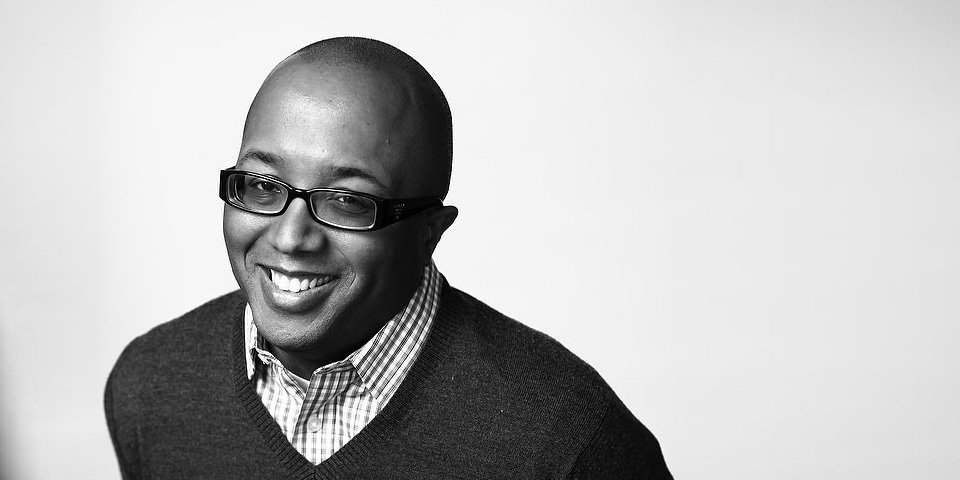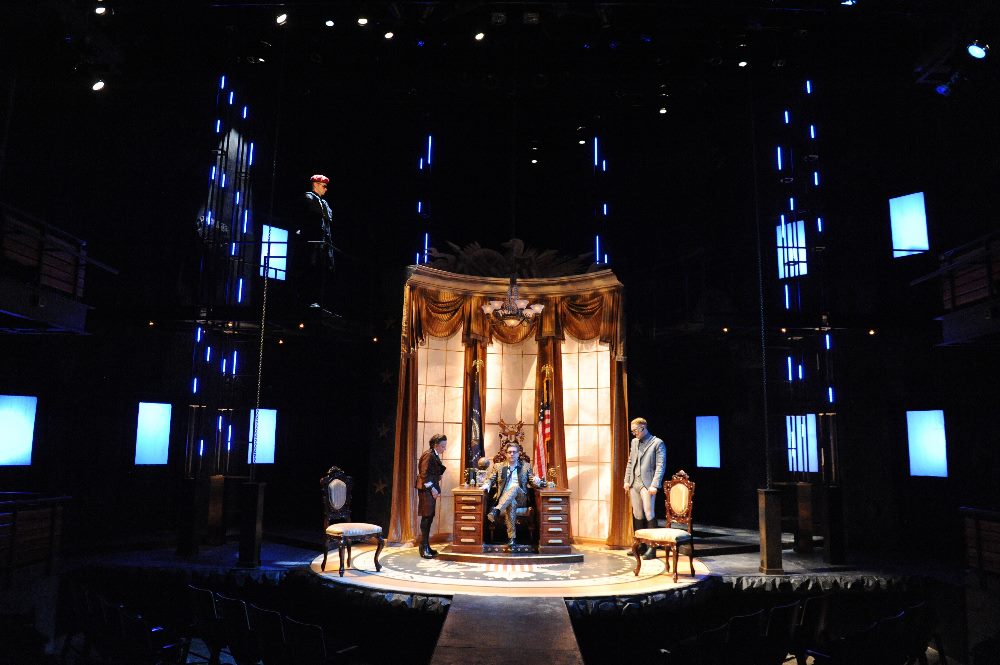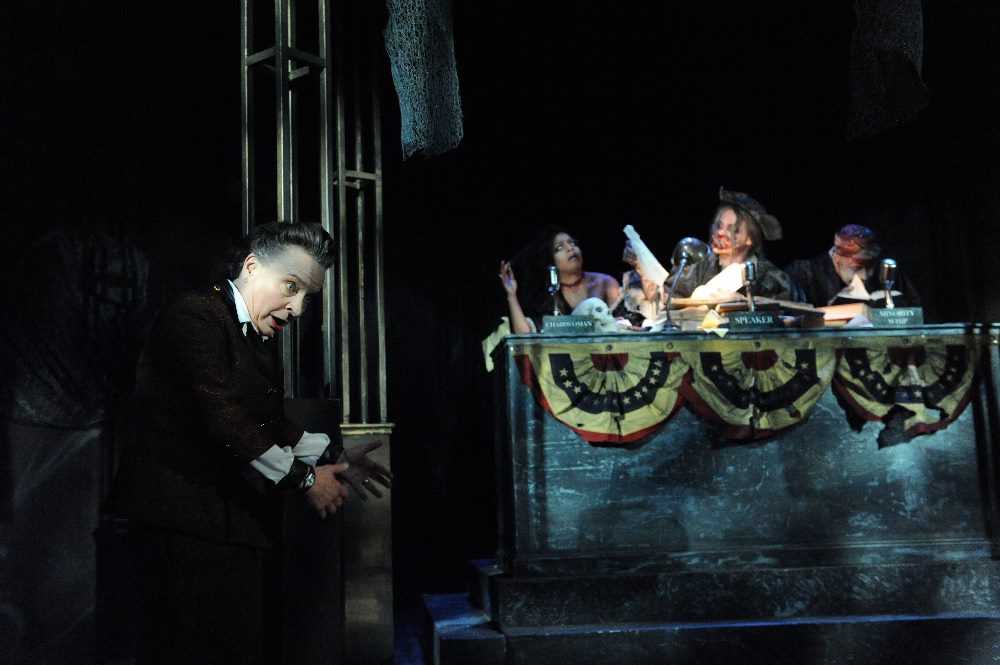WASHINGTON, D.C.: A wise man once said: “If you build it, they will come.” Especially if you add zombies. The first preview, on May 25, of Robert O’Hara’s newest play Zombie: The American at Woolly Mammoth Theatre Company sold out, and concluded with cheering as the curtain fell. It’s no wonder that audiences were lining up hours beforehand for tickets; the show practically markets itself. “Who doesn’t want to see a play called Zombie: The American?” says director Howard Shalwitz with a chuckle. “The title helps.”
With zombies making a consistent appearance on television these days (The Walking Dead, iZombie, Game of Thrones), it’s no surprise that theatres are getting in on the undead action. O’Hara’s Zombie takes place in 2063 America, as the first gay president has just been elected for a second term and the Atlantic seaboard is underwater following a global warming crisis, Africa is now a superpower and the terror alert is set to pink polka dot. Oh—and there are zombies in the White House basement.
Homosexuality, racism, global warming, zombie apocalypse—it’s a plate full of topics for viewers to chew on. “I don’t start writing until there’s 15 heavy topics in my head,” O’Hara claims over the phone.

Perhaps that’s why he’s such a good fit for Woolly Mammoth, where the subject matter tends to veer towards the experimental, irreverent and wildly uncomfortable. As a character in Zombie puts it, “All of the shit that America has put the world through throughout its paltry existence is indeed because of W.M.D. White. Men. Did it.”
“I’ve always believed that theatre’s job is to provoke,” says Shalwitz, artistic director and cofounder of Woolly Mammoth, who says he’s used to getting hate mail. “If you don’t offend somebody, you’re probably not doing anything remotely interesting.”
Zombie, running through June 21, was inspired by a late-night tour that O’Hara took of the White House, where he was struck by its austerity, its lack of pomp or crown jewels. “It was very sort of zombie-like. I began thinking about our lack of government response on anything that’s actually important. Instead, we’re just mulling around on whether gay people should get married, minimum wage and who should say what when. That started playing in my head. How are we also zombies?”
Ever since George Romero’s seminal film Night of the Living Dead, zombies have occupied a place in the American imagination not only as monsters moaning for brains in the night, but as standins for the many social metaphors the undead horde can conjure: the degradation of society, environmental catastrophe, the AIDS crisis, sheer human viciousness.
O’Hara takes that tradition and puts it in a three-way with the heightened language and thematic tropes of a Jacobean tragedy and the biting political satire of Dr. Strangelove. His zombies are not mindless armies grabbing for flesh: They’re politicians with a taste for raw human, who represent the violent side of American history that is often ignored or glossed over in favor of American exceptionalism. Instead of skeletons in the closet, if you will, it’s zombies in the basement.
“We still have shit that we refuse to deal with,” says O’Hara. “We still get up on Inauguration Day and say, ‘Land of the free and home of the brave.’ As if no one knows exactly how we got to this country [today].” And it’s not just dusty history: “You think of ISIS, our relationship to creating ISIS, what we’ve done to Iraq. We built the monster, and now we have monsters coming out of woodwork.”

Woolly Mammoth and O’Hara’s long-standing relationship began when O’Hara directed Danai Gurira’s In the Continuum in 2006. The theatre later premiered two of O’Hara’s plays: Antebellum (which won a Helen Hayes Award for best play) and Bootycandy. They then made him a company member, and for the past two years, thanks to a grant from the Mellon Foundation, O’Hara has occupied the theatre’s playwright-in-residence seat; he has also directed various productions at Woolly.
It’s a testament to this relationship that Zombie is one of the most ambitious productions ever mounted at Woolly.
“It’s only a cast of eight, but three of the eight characters play both political figures and zombies, and they have to get in and out of their zombie makeup twice over the course of each performance,” says Shalwitz. “We can probably sell tickets for people to just watch what goes on backstage.”
Zombie was also the first play commissioned in the theatre’s Free the Beast! project, which aims to develop 25 new plays over 10 years (it began in 2012). Works that Free the Beast! has spawned so far include Arguendo from Elevator Repair Service and the widely produced Chekhov riff Stupid Fucking Bird by Aaron Posner.
O’Hara is aware that his play may be a hard swallow for some audiences and theatres, but he hopes that the presence of zombies, and a certain amount of humor, leaven the drama and politics.
“It’s a satire,” he says. “You set up an edge of humor and you walk that fine line: Is it funny, is it disturbing? It should be both, in a way. It’ll allow you to prepare the audience to have their throats slit, if you will.”


